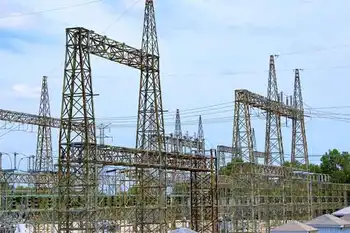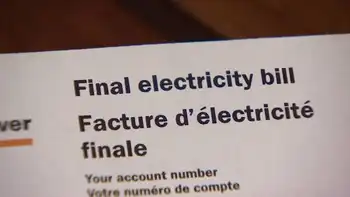On electricity, itÂ’s not all about HST in Ontario
By Globe and Mail
NFPA 70b Training - Electrical Maintenance
Our customized live online or in‑person group training can be delivered to your staff at your location.

- Live Online
- 12 hours Instructor-led
- Group Training Available
A closer look reveals a lot more complexity and a lot more moving parts, some of which extend beyond your electricity bill. They raise major challenges for the two leading parties, and a series of questions that voters should reflect on independent of the parties.
On the campaign trail, youÂ’ll hear most often about the HST irritant. After provincial and federal sales taxes were harmonized on July 1, 2010, electricity rates went up by 8 per cent. Ontarians now pay around $1.2-billion annually in new taxes on electricity and home heating, and the Tories and NDP say they would repeal them if elected.
Two other lines on your electricity bill, less often discussed, involve similar amounts of money.
Like the HST, the Debt Retirement Charge raises your bill, adding 0.7 cents per kilowatt hour used onto every electricity usersÂ’ bill since 2002. It brings in just shy of $1-billion per year, costing the average household around $76 a year, and is one of the sources of revenue used to help pay off the inherited $38-billion debt from the old Ontario Hydro monopoly bloated in past decades by subsidized electricity rates and expensive nuclear plants. That debt will be eliminated between 2015 and 2018, the government estimates. The Tories want to scrap the DRC for households and smaller users.
Since January, the LiberalsÂ’ Clean Energy Benefit has reduced electricity bills, providing a 10 per cent discount for households, farms and small businesses. It will cost taxpayers $1.135-billion in 2011-12 and saves the average household $153.60 a year on their electricity bills. The NDP will let the benefit expire in 2016, at which point theyÂ’ll repeal the HST on electricity.
But apart from all of this, the base cost of electricity is going up, by around 7.9 per cent annually for the next five years, the Liberals admit. A little less than half of that is due to spending on system upgrades for facilities like nuclear plants and transmission lines and towers. A little over half of that is due to deals that give guaranteed payments to generators of cleaner, but more expensive forms of electricity, especially wind and solar energy and to Samsung, which manufactures that generating equipment.
For the Liberals, all of this presents a political challenge.
On the surface, their policy offers benefits that are apparently concentrated in a few hands and largely invisible to most. The cost is evident to everyone who pays a bill, and the Clean Energy Benefit isnÂ’t enough of a sweetener to offset the cumulative cost of the HST, increasing rates, and the ongoing DRC.
The Liberals would dispute this, saying that a more reliable electricity system and cleaner air benefit everyone. And on the campaign trail, Dalton McGuinty is disputing this in his choice of events, touting a green energy sector that he says will give Ontario a more general economic advantage. But that sector still isnÂ’t anywhere near the size of, say, the auto sector. And some worry that wind and solar, being dependent on the elements, canÂ’t be relied upon to constitute too great a share of OntarioÂ’s electricity generation mix.
And the more they get carried away with debates over green jobs, the more the Liberals drift from the legitimate concern about electricity bills. That means they may be advised to tout their Clean Energy Benefit a bit more, which at least offsets the HST and then some – even though it is an imperfect inoculation.
The Tories, though, have the larger policy problem.
By scrapping the DRC and the HST on energy, they promise an average reduction of $275 in household electricity bills. But they havenÂ’t disclosed how they would make up for the lost DRC revenue. The party that criticizes the Liberals for doubling OntarioÂ’s total provincial debt would, it appears, delay the repayment of a significant if much smaller debt.
Meanwhile, they want to keep the Clean Energy Benefit subsidy for ratepayers, even though they want to scrap the programs – feed-in-tariffs, which guarantee payments to generators of wind and solar power, and the Samsung manufacturing deal – that are helping to increase electricity generation supply.
In the absence of a more comprehensive electricity plan from the Tories, it suggests they foresee a return to the days when the government – via the taxpayers – effectively subsidized electricity for the ratepayers.
And that raises broader questions, where principle clashes with daily life, for voters.
Do they see electricity as a source of economic innovation in itself, or is merely the fuel that drives the rest of the economy?
Either way, should the government occasionally put its thumb on the scales to prefer one source of energy, or one class of users households, say, or large businesses, or the poor, over another, for reasons of cost, equity, environmental protection, or economic growth? Or should the market rule?
And are voters prepared to take steps, some with up-front costs, to reduce their own electricity consumption, which is the single best way to reduce their bills the base rate, the DRC and the HST are all, after all, tied to electricity usage? Or is that an unreasonable burden?
Electricity is the lifeblood of any economy. ItÂ’s too important to leave the thinking about it to the parties alone.















